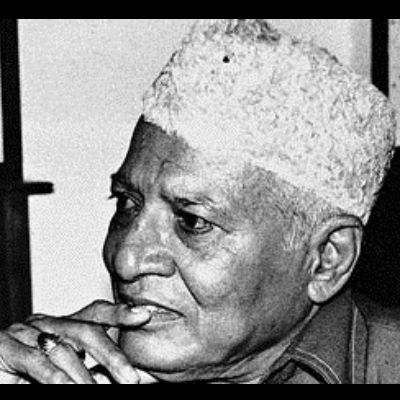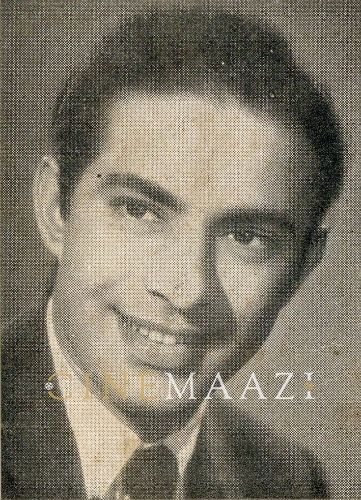"Samaj" A Memorable Film with Popular Appeal
15 Mar, 2023 | Archival Reproductions by Cinemaazi

Subscribe to read full article
This section is for paid subscribers only. Our subscription is only $37/- for one full year.
You get unlimited access to all paid section and features on the website with this subscription.
Not ready for a full subscription?
You can access this article for $2, and have it saved to your account for one year.
Released in Bombay on Friday, December 24, at the Swastik Cinema, Ashok Kumar Productions' second picture, "Samaj," produced by him and directed by Vasant Joglekar, is a memorable film, powerful in its indictment of social inequities and yet scrammed to the brim with just the things that make a film fine entertainment.
Based on a story by Sailajananda Mukherjee, with a theme solidly moored to life itself, "Samaj" stars Ashok Kumar, Usha Kiran, Shashikala and Anoop Kumar, with Nazir Hussain topping a distinguished supporting cast in which Dhumal and S N Banerjee (who also wrote the screenplay) make brief but arresting appearances as guest artistes.
"Samaj" is a turbulent story of two children apart by chance and accident, and reared in different homes. With this as the basis, there is unfolded a tale which portrays how life in the raw makes of one of the waifs a neighbourhood tough who becomes known as Dada. But in spite of his rough exterior and fearsome reputation, he is the living embodiment of virtue who dares to defy the cruel conventions of society.
His sister, on the other hand, is brought up by a poor but loving foster-parent who lavishes on her all his affection. By a queer quirk of fate they are thrown together, but until the climax of the story in which the long-parted father and children are re-united, misunderstandings cleared, lovers paired and the loose ends of the plot tied up, they remain in ignorance of their relationship, thus adding to the suspense and drama of the film.Though many of the incidents in the story are coincidental and highly contrived, and in places a trifle confusing, the general treatment, design and direction display the same social intent and atmosphere of the Company's earlier picture, "Parineeta," and overshadow these minor flaws.

Another notable feature of it is the fact that the message is put over without any attempt to sermonize. Driving its purpose with illustration rather than precept, with action more than words, the film at no place loses track of audience increase. Love and romance, songs and dances, humour and pathos, intrigue and melodrama-in short, everything that adds appeal-are presented and used with a lively appreciation of their worth which never forgets to keep treatment within the bounds of reality.
Another notable feature of it is the fact that the message is put over without any attempt to sermonize.
Almost all the performers have identified themselves with the cleverly-defined characters they portray, with Ashok Kumar distinguishing himself as an impeccable artist.Ashok has a meaty role in this picture and he does not halt or fumble even in sequences which fall far outside the field in which he has already made a mark.
As Dada the hoodlum-saint up against the dictates of an orthodox "samaj," he lives the role and makes it one of his finest portrayals to date. The role itself has been written with care and a rare understanding of human nature and life as it is to be found in the city's slums which throw up such characters.
Tossed as much by Fate, Usha Kiran as Dada's long-lost young sister has a well-written role and puts over a performance of consummate artistry and flawless expression which brings fresh laurels to this much-honoured artist.
Shashikala as the boisterous girl of the slums who loves Dada and finally marries him, and Amirbanoo, the veteran trouper, as her crippled but dauntless mother make these characters really come alive on the screen. Shashikala's scenes with Ashok Kumar, in which the dialogue-writer proves his mettle, keep the house roaring.
Anoop Kumar is adequate as a wealthy playboy in love with the star-crossed waif. Nazir Hussain, Leela Misra, Sampson, Iftekhar, Sumati Gupte, newcomers Jamal and Heera Sawant, and the juveniles are others who distinguish themselves in the excellent supporting cast.
While all these players do justice to the roles allotted to them, the one exception is Agha who is generally a dependable artist. As Rukmini Seth, the right-fisted father of a spendthrift son, his efforts to make people laugh fail miserably, and he hams and clowns to make the character he set out to portray an insipid caricature.
Coming to the music score of "Samaj", it is good in parts. The lyrics are well written and the rendering is superb, but the background music is mediocre.
Skillfully photographed, the film excels in appropriate sets, decor and costumes.
This article was published in Filmfare magazine’s 7 January, 1955 edition as a part of 'Filmfare Reviews' of the film "Samaj" (1954).
About the Author
Other Articles by Cinemaazi
17 Feb,2024
What is a Good Documentary Film?
25 Jan,2024
Salute to an Immortal Spirit
22 Jan,2024
A Painful Parting
29 Nov,2023
Children's Film Society
28 Oct,2023
Let's Give the Kids a Chance
26 Oct,2023
Directing the Child Actor
25 Oct,2023
Chandu - The Elephant Boy
23 Oct,2023
HEROISM-Children's Film Society gives the lead
18 Oct,2023
Munna
29 Sep,2023
ख्वाजा अहमद अब्बास का पत्र महात्मा गांधी के नाम
02 Sep,2023
Shakti Kapoor: It's Three Punches A Day
04 Jul,2023
Should a Filmmaker be Original?
24 Jun,2023
Babita My First Screen Love
22 Jun,2023
Phir Wohi Dil Laya Hoon
19 Jun,2023
Romance in Our Cinema
12 Jun,2023
The Romance of our Show Houses
12 Jun,2023
Kashmir Ki Kali (1964)
07 Jun,2023
Sangam (1964)
05 Jun,2023
This thing called Love
25 May,2023
Gandhi: Whose voice?
15 May,2023
"Deewar" Becomes a Nation's Prayer
15 May,2023
Mangal Pandey
06 May,2023
History of Cinema, History of the Nation
02 May,2023
Birbal Paristan Mein
20 Apr,2023
Reincarnation... the story goes on ever after
27 Mar,2023
The Film Director?
21 Mar,2023
M Sadiq
15 Mar,2023
The Social Role of the Cinema
01 Mar,2023
"Two Eyes" in Hollywood
20 Feb,2023
Do Dooni Chaar
15 Feb,2023
Rafoo Chakkar
07 Feb,2023
Johnny Walker.... still going strong
20 Jan,2023
Mahabharat : Epic Tamasha
10 Jan,2023
Narsi Bhagat : An Excellent Biography
03 Jan,2023
Nav Ratri
01 Dec,2022
एक ताजगी का नाम है देवानन्द (Dev Anand)
25 Nov,2022
जे बी एच वाडिया (J B H Wadia) - वचन न जाए
14 Nov,2022
Children's Films in India
01 Sep,2022
Horses .... Cars and Laughs-Mehmood
06 Aug,2022
हिन्दी फिल्मों की दुर्दशा का जिम्मेदार कौन?
01 Aug,2022
क्या हिंदी फिल्मों से हास्य गायब हो रहा है?
20 Jul,2022
हास्य की परंपरा और हास्य अभिनेताओं की भूमिका
12 Jul,2022
प्राण और उनकी दाढ़ियाँ
17 Feb,2022
Odds Against a New Comer
10 Dec,2021
Speaking of Portraits and People
03 Nov,2021
An Actor Prepares
19 Oct,2021
Producers' War on Dubbed Films
24 Aug,2021
Jottings from a Film Director's Notebook
26 Jul,2021
प्रेमचंद सत्यजीत राय और ’सद्गति’ -गिरिजाशंकर
22 Jul,2021
Rewind 1990 Commerce of Love Stories
20 Jul,2021
Eastern Scene: Cinema of Surviving Faith
22 Jun,2021
Movie Memories : Tansen (1943)
22 Jun,2021
Movie Memories: Sikandar (1941)
15 Jun,2021
Towards A Brighter Future- Bengali Cinema
20 May,2021
The Enigma Of A Flux - Malayalam Cinema
05 May,2021
The seesaw graph of Hindi filmdom
03 May,2021
Ankahee: The Unspoken
29 Apr,2021
The Mahatma Returns: World Press Reaction
29 Apr,2021
Children’s Films
17 Apr,2021
Telugu Cinema in 1986- Sons and Fathers
09 Apr,2021
Mukhamukham : Face to Face
08 Apr,2021
Tarang : Wages and Profits
01 Apr,2021
Design In Indian Cinema
27 Mar,2021
Movie Memories : Savkari Pash
23 Mar,2021
Double Trouble: Role of Twins In Hindi Cinema
22 Mar,2021
Prem Chopra: The Same Role For Ever
19 Mar,2021
Kalyan Kumar - Karnataka’s Self-Made Star
18 Mar,2021
Ceylon's Cyclonic Cinema
18 Mar,2021
Movie Memories : Aladdin & the Wonderful Lamp
17 Mar,2021
Kumari Padmini: Rising New Star Of The South
11 Mar,2021
50 YEARS OF MALAYALAM CINEMA
02 Mar,2021
Alakh Niranjan: Film India Review
27 Feb,2021
Party: The Story of Choices
26 Feb,2021
The Naushad Era In Hindi Film Music
19 Feb,2021
A Man: Amitabh Bachchan -Amitabh, is My Name
10 Feb,2021
A Man: Amitabh Bachchan - Two of a Kind
29 Jan,2021
Women In Hindi Films : Dichotomy of Values
22 Jan,2021
A Man: Amitabh Bachchan - Yesterday and Tomorrow
22 Jan,2021
Cinema in the South: Crisis of Character
18 Jan,2021
Film Societies Play Their Part
01 Jan,2021
Nutan : A Flashback - The Actress
30 Dec,2020
"Gwalan" Proves A Thrilling Entertainment !
29 Dec,2020
Rajesh Khanna : Echoes Of An Era- Family Of Four
28 Dec,2020
Holi: A Metaphor for Horizontal Violence
23 Dec,2020
A Summon for Mohan Joshi
22 Dec,2020
Nutan : A Flashback - The Friend
22 Dec,2020
Raj Kapoor Scores Personal Triumph In “Aag”!
19 Dec,2020
Smita Patil's Memoir- Trading Places
17 Dec,2020
Shashi Kapoor: Once Upon A Time- The Film Makers
16 Dec,2020
Rajesh Khanna : Echoes Of An Era- Peer Pressures
15 Dec,2020
“Lal Haveli”- Crude But Entertaining!
12 Dec,2020
Nutan : A Flashback - The Wife
10 Dec,2020
Rajesh Khanna : Echoes Of An Era
09 Dec,2020
"Lalkar" Presents Cheap Entertainment
07 Dec,2020
Smita Patil's Memoir-Comrades In Arms
01 Dec,2020
Shashi Kapoor: Once Upon A Time- Unjinxed
28 Nov,2020
Ek Din Ka Sultan- Becomes Good Entertainer !
26 Nov,2020
Smita Patil's Memoir- Friendly Strokes
25 Nov,2020
Shashi Kapoor: Once Upon A Time- Tough Times
07 Nov,2020
The Technician And His Problems
06 Nov,2020
We Must Inject Dynamism Into Publicity
05 Nov,2020
The Role Of Film Finance Corporation
04 Nov,2020
Progress In Raw Film
30 Oct,2020
Freedom In Films
28 Oct,2020
Export Market For Indian Films
23 Oct,2020
The Growth of The Motion Picture
22 Oct,2020
Setup Of The Film Industry
21 Oct,2020
Few Facts About Film Production
13 Oct,2020
Personalisation In Cinema
08 Oct,2020
Waiting for a Doyen's Glance- Arati Bhattacharya
08 Oct,2020
कौन सुनेगा इन सिसकती बिलखती प्रतिभाओं का विलाप?
06 Oct,2020
Asrani - Laugh And The World Laughs With You
05 Oct,2020
My Memorable Roles- Hiralal
03 Oct,2020
राजीव गोस्वामी - कहां थे अब तक 'पेंटर बाबू'?
03 Oct,2020
जब नफरत से बेड़ा पार हो गया: बलराज साहनी
30 Sep,2020
The Case of Emotional Turmoil In Dopatta (1952)
29 Sep,2020
The Story Of A Child Artiste - Sheela Kashimiri
26 Sep,2020
Afsana Likh Rahi Hoon : Tun Tun
26 Sep,2020
Some Hopes For The New Year: Lillian
24 Sep,2020
Joru Ka Bhai: A Tale of 'Atithi Tum Kab Jaoge'
22 Sep,2020
अभिनेता प्रेमअदीब से भेंट
21 Sep,2020
Vijaylaxmi: A Career As The 'Other' Woman
18 Sep,2020
Shaminder: The Actor Who Had High Hopes
16 Sep,2020
धर्मेन्द्र - समय आ रहा है...
14 Sep,2020
Film Life After Fifty : Motilal
14 Sep,2020
प्रसिद्ध फिल्म लेखक गुलशन नंदा से आपकी बातचीत
11 Sep,2020
"I live on hope"- Kumkum
11 Sep,2020
Thehr Zara O Jane Wale : Madhubala Jhaveri
09 Sep,2020
Ratnamala Attracts Attention In ‘Station Master’
08 Sep,2020
Ghory: The Laurel Of Indian Cinema's Comedy Duo
07 Sep,2020
Yeh Teri Saadgi, Yeh Tera Baankpan: Usha Khanna
07 Sep,2020
सेनापति शेट्टी
05 Sep,2020
कृतिदेव यहां मैं, तनूजा, स्वीकार करती हूँ
05 Sep,2020
मै उर्मिला को भूल नहीं पाती - मंजरी
04 Sep,2020
बुलबुल बंगाल की: चंद्राणी मुखर्जी
03 Sep,2020
Payyal's Lucky Break
02 Sep,2020
These Foreign Producers
29 Aug,2020
The Practical Actress: Shabnam
29 Aug,2020
“Amrit” Becomes A First Class Picture
28 Aug,2020
फिल्मी मारपीट के गुरू : अजीम भाई
26 Aug,2020
From Poverty to Screen Fame - Mehboob Khan
26 Aug,2020
Humility: Nasreen's Most Admirable Feature
24 Aug,2020
A Mercenary Comes To India - Bob Christo
23 Aug,2020
Dilip Kumar: The Leader
19 Aug,2020
Alam Ara: Ardeshir Irani's Ambitious Secret
17 Aug,2020
I Serve My Art- Kanan Devi
10 Jul,2020






.jpg)


